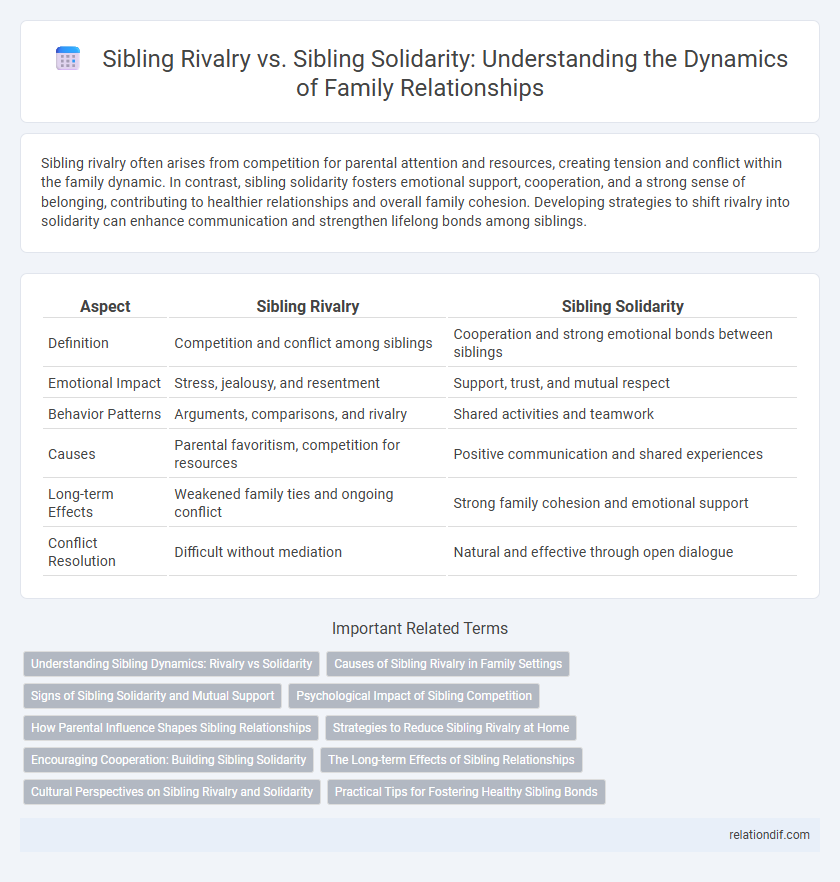Sibling rivalry often arises from competition for parental attention and resources, creating tension and conflict within the family dynamic. In contrast, sibling solidarity fosters emotional support, cooperation, and a strong sense of belonging, contributing to healthier relationships and overall family cohesion. Developing strategies to shift rivalry into solidarity can enhance communication and strengthen lifelong bonds among siblings.
Table of Comparison
| Aspect | Sibling Rivalry | Sibling Solidarity |
|---|---|---|
| Definition | Competition and conflict among siblings | Cooperation and strong emotional bonds between siblings |
| Emotional Impact | Stress, jealousy, and resentment | Support, trust, and mutual respect |
| Behavior Patterns | Arguments, comparisons, and rivalry | Shared activities and teamwork |
| Causes | Parental favoritism, competition for resources | Positive communication and shared experiences |
| Long-term Effects | Weakened family ties and ongoing conflict | Strong family cohesion and emotional support |
| Conflict Resolution | Difficult without mediation | Natural and effective through open dialogue |
Understanding Sibling Dynamics: Rivalry vs Solidarity
Sibling dynamics often oscillate between rivalry and solidarity, influenced by factors such as birth order, personality differences, and parental treatment. Rivalry can stem from competition for attention and resources, while solidarity emerges through shared experiences and mutual support across life stages. Understanding these contrasting behaviors is crucial for fostering healthier family relationships and emotional resilience among siblings.
Causes of Sibling Rivalry in Family Settings
Sibling rivalry often stems from parental favoritism, competition for attention, and differences in temperament or interests. Limited family resources such as time, space, and parental energy can intensify conflicts between siblings. Environmental stressors and unresolved parental conflicts further exacerbate tensions within family dynamics.
Signs of Sibling Solidarity and Mutual Support
Sibling solidarity manifests through shared emotional support, cooperative problem-solving, and consistent communication, fostering a strong family bond. Signs include willingness to defend each other in conflicts, celebrating individual achievements together, and providing comfort during difficult times. Mutual support is evident when siblings collaborate on family responsibilities and actively engage in each other's personal growth and well-being.
Psychological Impact of Sibling Competition
Sibling rivalry can lead to increased stress, anxiety, and low self-esteem in children, affecting their emotional well-being and social development. Conversely, sibling solidarity fosters emotional support, resilience, and positive communication skills, contributing to healthier mental health outcomes. Psychological research indicates that balanced sibling relationships play a critical role in shaping long-term interpersonal abilities and conflict resolution strategies.
How Parental Influence Shapes Sibling Relationships
Parental influence plays a crucial role in shaping sibling relationships by modeling communication patterns and conflict resolution strategies. When parents demonstrate fairness and encourage empathy, siblings are more likely to develop solidarity and cooperative behaviors. Conversely, favoritism or inconsistent discipline can exacerbate rivalry and foster long-term resentment among siblings.
Strategies to Reduce Sibling Rivalry at Home
Effective strategies to reduce sibling rivalry at home include establishing clear and consistent rules that promote fairness and respect among children. Encouraging open communication and active listening helps siblings understand each other's perspectives, fostering empathy and cooperation. Parents can also create opportunities for joint activities that build teamwork, strengthening sibling solidarity and minimizing conflicts.
Encouraging Cooperation: Building Sibling Solidarity
Promoting cooperation among siblings strengthens their bond and reduces conflicts, fostering a harmonious family environment. Encouraging shared activities and open communication helps siblings develop empathy and resolve disagreements constructively. Parents can model collaborative behavior and reinforce positive interactions to build lasting sibling solidarity.
The Long-term Effects of Sibling Relationships
Sibling rivalry often leads to increased stress and lowered self-esteem, potentially causing lasting emotional scars and difficulties in forming trusting relationships later in life. In contrast, sibling solidarity fosters strong emotional support systems, enhancing social skills and resilience, which contribute positively to mental health and well-being over time. Research indicates that the quality of sibling relationships during childhood significantly influences adult interpersonal dynamics and psychological stability.
Cultural Perspectives on Sibling Rivalry and Solidarity
Cultural perspectives significantly shape sibling rivalry and solidarity, influencing family dynamics across societies. In collectivist cultures, sibling solidarity is emphasized, fostering cooperation and mutual support as vital for family cohesion and social harmony. Conversely, individualistic cultures may experience more pronounced sibling rivalry due to competitive values encouraging personal achievement and distinct identities.
Practical Tips for Fostering Healthy Sibling Bonds
Encouraging open communication, setting consistent boundaries, and modeling conflict resolution can significantly reduce sibling rivalry and build sibling solidarity. Scheduling regular family activities and promoting teamwork through shared responsibilities foster empathy and cooperation among siblings. Providing individual attention and celebrating each child's unique strengths helps nurture mutual respect and lasting bonds.
Sibling Rivalry vs Sibling Solidarity Infographic

 relationdif.com
relationdif.com